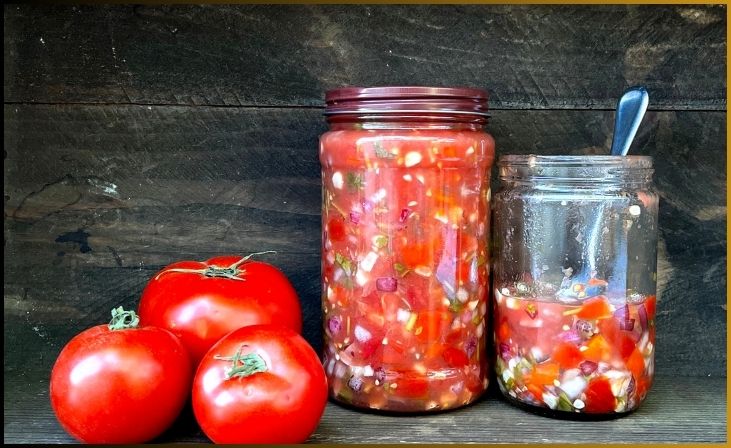Embark on a culinary adventure as we delve into the captivating realm of fermented fruits. In our blog, “6 Delicious Ways to Use Fermented Fruit,” we unravel the secrets of transforming ordinary fruits into extraordinary culinary delights. The age-old practice of fermentation not only imparts a unique depth of flavor to fruits but also unlocks a plethora of health benefits. From zesty salsas to rich chutneys, refreshing beverages, and indulgent desserts, we explore six mouthwatering ways to incorporate fermented fruits into your everyday meals.
Join us on this flavorful journey and elevate your gastronomic experience with the vibrant and probiotic-rich world of fermented fruits. Whether you’re a seasoned food enthusiast or a curious beginner, these creative recipes are sure to tantalize your taste buds and inspire culinary innovation.
Table of Contents
ToggleDelicious Ways to Use Fermented Fruit
Unleash a world of taste with our “Delicious Ways to Use Fermented Fruit” tips. Explore the art of fermenting fruits to create mouthwatering salsas, refreshing beverages, and decadent desserts that will redefine your culinary experience.
Fermented Fruit Salsas

Traditional salsas get a flavor upgrade with the introduction of fermented fruits. Whether it’s mango, pineapple, or even berries, fermenting these fruits adds a delightful tanginess and depth to the salsa. To create a fermented fruit salsa, dice your chosen fruits and mix them with ingredients like onions, cilantro, lime juice, and a touch of salt. Allow the mixture to ferment for a day or two, letting the natural sugars in the fruits undergo a transformative process. The result is a zesty and probiotic-rich salsa that pairs perfectly with grilled meats, fish, or as a vibrant topping for tacos.
Fermented Fruit Chutneys

Chutneys have long been a staple in various cuisines, offering a perfect blend of sweet, savory, and spicy flavors. Adding fermented fruits to your chutney recipe takes this condiment to new heights. Try fermenting apples, peaches, or plums with spices like cinnamon, ginger, and cloves for a rich and complex chutney. This versatile condiment can be enjoyed with cheeses, roasted meats, or spread on sandwiches for a burst of unique flavor. The fermentation process not only enhances taste but also increases the bioavailability of nutrients, making your chutney a healthy addition to any meal.
Also Read- Delicious Lacto-Fermented Pumpkin
Fermented Fruit Beverages

Upgrade your beverage game by experimenting with fermented fruit drinks. Start with a base of fermented fruit puree, add water or sparkling water, and sweeten to taste. The result is a naturally effervescent and probiotic-rich beverage. For a refreshing summer drink, try fermenting watermelon or cucumber with a hint of mint. Alternatively, mix fermented berry puree with lemonade for a tangy twist on a classic favorite. These beverages not only quench your thirst but also contribute to gut health, making them a tasty and nutritious alternative to commercially available sugary drinks.
Don't just scroll, subscribe!
BuzzTrail's unique web-stories are the cure for boredom you've been waiting for.
Fermented Fruit Compotes

Fermented fruit compotes offer a sophisticated twist to your breakfast or dessert. Simmering fermented fruits with a touch of honey or maple syrup creates a luscious and syrupy compote that can be drizzled over pancakes, yogurt, or ice cream. The fermentation process intensifies the natural sweetness of the fruits while adding a subtle complexity to the flavor profile. Experiment with different fruit combinations such as berries with balsamic vinegar or peaches with thyme to elevate your dishes and impress your taste buds.
Fermented Fruit Desserts

Satisfy your sweet tooth with fermented fruit desserts that marry the richness of traditional sweets with the health benefits of fermentation. Consider fermenting fruits like cherries, apricots, or figs and using them as toppings for cakes, tarts, or even as a filling for pastries. The fermentation process not only imparts a unique flavor but also helps break down sugars, making these desserts easier on the digestive system. Pair fermented fruit with yogurt or custard for a decadent yet health-conscious treat that will leave your taste buds dancing.
Fermented Fruit Salad

Give your fruit salad a probiotic boost by incorporating fermented fruits into the mix. Fermenting fruits like grapes, kiwi, or citrus adds a tangy kick to the salad while retaining the inherent sweetness. Combine fermented fruits with fresh ones, toss in some chopped herbs like mint or basil, and drizzle with a simple vinaigrette for a refreshing and gut-friendly salad. This dish is not only a feast for the senses but also a nutritional powerhouse, providing a mix of vitamins, antioxidants, and beneficial bacteria.
For More- Fermented Lemons and Mint
Tips to Choose the Right Fruits for Fermentation
Selecting the right fruits is crucial for successful fermentation. Consider these tips to ensure a flavorful and satisfying fermentation process:
- High Sugar Content: Opt for fruits with naturally high sugar content, as these sugars fuel the fermentation process, resulting in a tangy and flavorful product. Examples include grapes, apples, and berries.
- Texture Matters: Choose fruits with a firm texture to maintain structure during fermentation. Softer fruits can become mushy, affecting the overall quality of the final product. Apples, pears, and plums are excellent choices.
- Balanced Acidity: Look for fruits with a balanced acidity level. This ensures a pleasant tartness in the fermented outcome. Citrus fruits, pineapples, and certain berries often possess the right acidity for fermentation.
- Avoid Overripe Fruits: Select fruits that are ripe but not overly so. Overripe fruits may already have unwanted microorganisms or spoilage, leading to off flavors in the fermentation.
- Blend Flavors: Experiment with combining different fruits to create complex flavor profiles. For example, pairing sweet apples with tart berries or adding a citrus twist to stone fruits can result in delightful combinations.
- Organic and Unwaxed: Whenever possible, choose organic and unwaxed fruits. The presence of pesticides or wax on the skin can interfere with the natural fermentation process and affect the taste of the final product.
- Consider Seasonality: Embrace seasonal fruits for the freshest and most flavorful outcomes. Seasonal produce tends to have optimal ripeness and can offer unique flavor nuances to your fermented creations.
Conclusion
Fermented fruits open up a world of culinary possibilities, offering a unique way to enhance the flavors and nutritional value of your favorite dishes. Whether you’re experimenting with salsas, chutneys, beverages, compotes, desserts, or salads, the process of fermentation adds a layer of complexity and depth that traditional recipes often lack. Embrace the art of fermentation in your kitchen and discover the delightful transformation of fruits into vibrant, probiotic-rich creations that will not only tantalize your taste buds but also contribute to your overall well-being. So, go ahead, embark on a journey of culinary creativity, and let fermented fruits be the star of your next gastronomic adventure.
FAQs
What is the process of fermenting fruits?
What is the process of fermenting fruits?
Fermenting fruits involves allowing the natural sugars in the fruits to undergo a fermentation process with the help of beneficial bacteria and yeast. Typically, fruits are chopped or pureed and mixed with a small amount of salt or a starter culture. The mixture is then left to ferment at room temperature for a specified period, allowing the development of unique flavors and beneficial probiotics.
Why should I ferment fruits?
Why should I ferment fruits?
Fermenting fruits not only enhances their flavor but also increases their nutritional value. The fermentation process breaks down sugars and other compounds, making the fruits more digestible. Additionally, the presence of probiotics in fermented fruits can contribute to improved gut health.
What types of fruits are suitable for fermentation?
What types of fruits are suitable for fermentation?
Many fruits can be successfully fermented. Common choices include berries, apples, peaches, plums, mangoes, and citrus fruits. Experiment with different combinations to discover your preferred flavor profiles.

